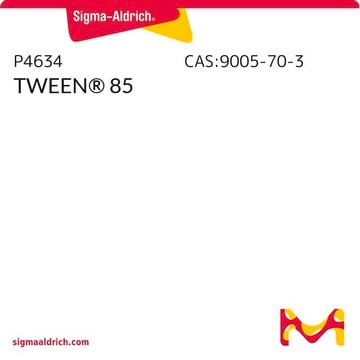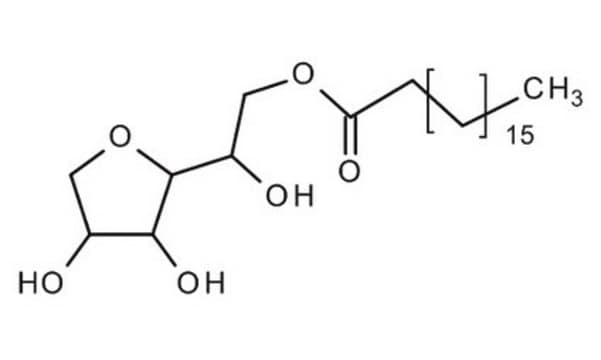S7135
Span® 85
Synonyme(s) :
Sorbitane trioleate
About This Item
Produits recommandés
Description
non-ionic
Poids mol.
957.52 g/mol
Solubilité
chloroform: 50 mg/mL, clear, faintly to light yellow
HLB
1.8
Chaîne SMILES
CCCCCCCC\C=C/CCCCCCCC(=O)OC[C@@H](O)C1OC[C@H](OC(=O)CCCCCCC\C=C/CCCCCCCC)[C@H]1OC(=O)CCCCCCC\C=C\CCCCCCCC
InChI
1S/C60H108O8/c1-4-7-10-13-16-19-22-25-28-31-34-37-40-43-46-49-56(62)65-52-54(61)59-60(68-58(64)51-48-45-42-39-36-33-30-27-24-21-18-15-12-9-6-3)55(53-66-59)67-57(63)50-47-44-41-38-35-32-29-26-23-20-17-14-11-8-5-2/h25-30,54-55,59-61H,4-24,31-53H2,1-3H3/b28-25-,29-26-,30-27+/t54-,55+,59-,60-/m1/s1
Clé InChI
ZBNRGEMZNWHCGA-WECPCUOASA-N
Catégories apparentées
Description générale
Application
Autres remarques
Informations légales
Code de la classe de stockage
10 - Combustible liquids
Classe de danger pour l'eau (WGK)
WGK 1
Point d'éclair (°F)
437.0 °F
Point d'éclair (°C)
225 °C
Équipement de protection individuelle
Eyeshields, Gloves, type ABEK (EN14387) respirator filter
Certificats d'analyse (COA)
Recherchez un Certificats d'analyse (COA) en saisissant le numéro de lot du produit. Les numéros de lot figurent sur l'étiquette du produit après les mots "Lot" ou "Batch".
Déjà en possession de ce produit ?
Retrouvez la documentation relative aux produits que vous avez récemment achetés dans la Bibliothèque de documents.
Les clients ont également consulté
Notre équipe de scientifiques dispose d'une expérience dans tous les secteurs de la recherche, notamment en sciences de la vie, science des matériaux, synthèse chimique, chromatographie, analyse et dans de nombreux autres domaines..
Contacter notre Service technique












